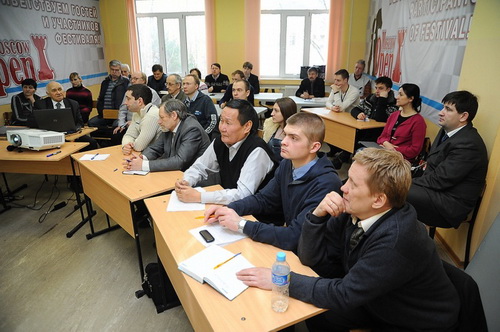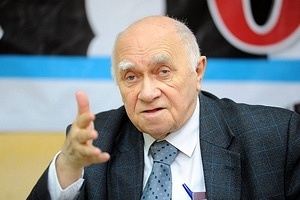The arbiters’ seminar was held in the course of four days from Feb 2 to Feb 5 as part of the Moscow Open 2014. The seminar have become a great tradition of the festival. This year the arbiters advanced their level under the supervision of the head arbiter of the RSSU Men’s and Women’s Student Grandmaster Cup, International Arbiter Anrzej Filipowicz and the Moscow Open Deputy Director, International Arbiter Artem Akhmetov. Yesterday the participants passed the exam and the event was summed up.
- Mr. Filipowicz, what can you tell us when the seminar are over?
- It was my third seminar in Moscow and the third seminar under the umbrella of the Moscow Open festival. We tried to examine the old and the new chess rules at the seminar. As everybody knows, the new rules will be implemented starting from July 1, 2014. We were comparing the FIDE new rules and the rules existing in Russia now and approved by the Ministry of Sport. I can say I’m satisfied with the seminar and the level of the arbiters, who participated in the event.
- Artem, how did you manage to combine the seminar for the FIDE arbiters and the All-Russian seminar?
- We really tried to provide the participants with all the information on not only the new rules but also the regulations that are existing right now and will be existing for five more months. We have gathered qualified arbiters, those who just start to make the first steps in the refereeing, people of different age, male and female, having different level of experience.
- Andrzej, what specific points did you pay special attention to?
- First of all are the questions regarding the decisions made at the board. A qualified arbiter must make the decisions immediately without consulting the rule book or asking for somebody’s advice.
- What can you tell in general about the level of the Moscow arbiters and candidate arbiters?
- The Moscow seminars always gather experienced arbiters. It’s always a pleasure and of interest to talk to them. A great number of different competitions are organized in Russia every year. They provide arbiters with a chance to gain invaluable experience. And besides it’s always interesting to listen to different experiences and tournament jokes that the participants of the seminar are sharing with us.
- So you think that Russia is the right place for a chess arbiter to get enough experience?
- Surely. Despite the fact that for some time there have been conversations that Russia doesn’t enjoy its previous success in chess, I can easily assert the contrary situation now. Your National Team won the World Champion title in the teams’ competitions, and the Women’s National Team won the Olympiad twice. You host domestic tournaments as well as various international competitions of the highest level. Arbiters have an opportunity to officiate the prestigious tournaments, for instance, the candidates’ tournament that will be organized this year in Khanty-Mansiysk.

- Have you ever been to this city?
- I’ve been here twice, during the Olympiad and at the Blitz and Rapid Chess World Championship one year ago.
- Artem, please tell us more about the tests that the participants had to pass today. Were those tests the same for the arbiters in both Russian and FIDE categories?
- The questions were the same, but the answers were different (everybody is laughing). The test form is standard. It's comprised of 40 questions. The norm is also standard with 80%, which is 32 correct answers, being enough to obtain the FIDE arbiter title. This score is also enough to receive the All-Russian category. The participants had to choose the correct answer out of three choices, though some questions are suppose to have two correct answers. While preparing for the testing of arbiters I always try to experiment and to prepare interesting questions. There are some disadvantages of such tests - you can’t get inside the arbiter’s head and understand the mechanics of his decision-making. A big advantage is that you can check the results very quickly. It’s very important especially when a great number of people have interest towards the seminar. Around 40 people have attended our seminar.- Andrzej Filipowicz: Another positive aspect of such tests is that a participant can just close his eyes and choose a right answer with the help of fortune (laughing).
- And the most important question: what are the results?
- Artem Akhmetov: The majority of the participants made us happy: they met and even exceeded the standard of 32 right answers. As I have already mentioned some of the participants are just taking the first steps in officiating. The scores that they received correspond to the level of their knowledge. I see nothing wrong with that, they still have a long way ahead. The main thing is I’m sure that the seminar was beneficial to all the participants and helped them to plunge more deeply into world of chess officiating.
We should also add that the program of the Moscow Open 2014 for chess qualification advancement has not finished. Master classes for coaches will be held from Feb 5 to Feb 7, and the FIDE seminar for organizers will be held on Feb 6-7.
The material was prepared by Anna Klyaeva
Photos - Galina Popova










